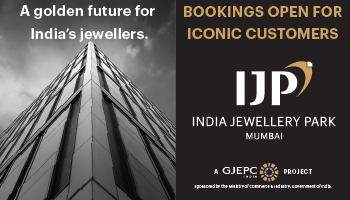 Mumbai: The Gem & Jewellery Export Promotion Council (GJEPC) and the Bharat Diamond Bourse (BDB) hosted a delegation from Botswana, led by its Vice President, HE Mokgweetsi Eric Keabetswe Masisi on October 26th 2015, at the Bourse Complex in Mumbai. At the meeting, attending by representatives of some of the largest member companies of the two organizations, Praveenshankar Pandya, Chairman of the GJEPC welcomed the guests warmly. He set the tenor of the meeting when he said: “You are the largest producers of rough diamonds and we are the largest manufacturing centre. We both have a common interest in ensuring that the diamond industry’s future is protected and to ensure that it prospers.”
Mumbai: The Gem & Jewellery Export Promotion Council (GJEPC) and the Bharat Diamond Bourse (BDB) hosted a delegation from Botswana, led by its Vice President, HE Mokgweetsi Eric Keabetswe Masisi on October 26th 2015, at the Bourse Complex in Mumbai. At the meeting, attending by representatives of some of the largest member companies of the two organizations, Praveenshankar Pandya, Chairman of the GJEPC welcomed the guests warmly. He set the tenor of the meeting when he said: “You are the largest producers of rough diamonds and we are the largest manufacturing centre. We both have a common interest in ensuring that the diamond industry’s future is protected and to ensure that it prospers.”
After giving the visitors a glimpse into the Indian manufacturing centre through a vibrant AV, Pandya took the delegation through a presentation on the Indian gems and jewellery industry outlining its salient points and highlighting its achievements. He noted that India has emerged as a leading centre polishing 14 out of every 15 stones set in jewellery worldwide. Pandya continued to discuss the problems confronting the diamond industry in the current scenario. “It is so difficult to survive,” he said. “Due to high rough prices and weak demand for polished and weakened prices, profitability is one of the biggest issues for our industry.”
He also pointed out that the Indian diamond industry holds a huge inventory – almost amounting to US$ 10 billion in India and another US$ 5 billion in its various offices abroad – over several months, considering the time involved from manufacturing a diamond, setting it in jewellery and marketing it. Compared to this, trading centres hold inventory for a relatively lesser period. “If the supply of rough diamonds is aligned with the demand, in this situation, it will beneficial for all,” Pandya urged.
Anoop Mehta, President, BDB, introduced the Bharat Diamond Bourse and the highlights of the Complex. “We have about 2,600 active offices within these premises, and everything necessary for the trade and business is available within the Complex,” he said. Mehta also informed those present about the newly set up Special Notified Zone within the Complex.
The HE, Vice President of Botswana said that he was impressed at the figures put forth by the Chairman of GJEPC and President of BDB. “I was not quite prepared for the largeness of the business,” he began referring to both the Complex and the strength of the GJEPC which stands close to 6,000 members as well as the number of diamonds processed and the employment figures. “We are well aware of the Indian industry in Botswana,” HE Masisi continued. “We as Botswana continue to view India as a very, very important partner. And when you value somebody, you keep them engaged perpetually.” The Vice President assured those present that Botswana understood that the diamond industry was going through difficult times and had heard very carefully the Indian point of view and would respond to it appropriately. “It is in our unique interest to see that the diamond industry recovers,” he said.
“We would not like to see anyone in the value chain getting hurt or losing money. Your pain is our pain. Your survival is our survival.” He concluded by saying that it was important to keep up a dialogue and engaging in open, transparent and honest discussions. The Minister for Presidential Affairs and Public Administration, the Hon’ble Eric Molale, said that a consultation between all stakeholders in the diamond industry is important and that all should be on the same wavelength.
“The threat of synthetics is coming at a time of difficult economic times,” he cautioned the trade. He added: “We as a country are very open to doing business and we would like to keep on improving the value chain. We will continue to be ready to interact.” He said that the pricing mechanism since 2011 needs to be discussed openly and that the issue of prices and pricing can be dealt with. “The bottomline is that we need to defend the natural diamond industry,” the Hon’ble Molale concluded.



